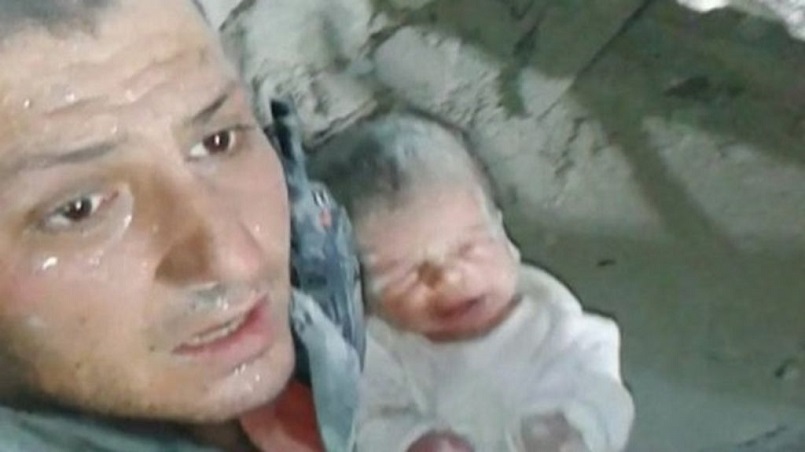
One thousand and one hundred days. That's the length of time in which they woke up daily thinking they might be lucky enough to dig one person out alive.
For more than 1,100 days, actually, they have opened their eyes every morning knowing that for one person they save, there will be many others who won't make it - who bleed to death, who will be burnt alive, who will suffocate, who give up.
And yet the Syrian Civil Defence still put on the white helmets that have become their namesake and rush to the rubble to find survivors and to bury the dead.
So far, they have saved 56,000 lives in Syria.
Compare that with the horrific overall death toll of 470,000 in the past five years, and make your own conclusions. Is it worth it? The White Helmets think it is. They think it's even worth their lives. And they die trying.
Khaled Harrah died trying. He was 29 when we met in 2014 for an interview. He was a White Helmets member in Aleppo travelling to Washington to tell lawmakers about what was really happening in Syria, and to ask them for assistance.
The visit came shortly after he rose to international fame by saving a 10-day-old baby from the rubble of a collapsed building in Aleppo. The baby - small, dusty and bloody, still screaming with his 10-day-old lungs - embodied the spirit of hope and became a symbol of life. The story went viral - for a while at least.
Determined but pale and tired, Khaled explained to me how he couldn't speak for two days after he pulled the "miracle baby" out of the rubble. His eyes glittered with innumerable lights while talking about it.
He was sad, though, and frustrated. He talked about how most of the time they only pull out the dead, how they fight against all odds and with minimal equipment.
What are the White Helmets?
- started early 2013 as a volunteer workforce
- includes bakers, tailors, carpenters, electricians
- 130 killed out of about 3,000 members
- nominated for Nobel Peace Prize
- say they are neutral, have no political affiliation and save people from all sides of conflict
- also do repair works, reconnect electrical cables and secure the buildings
- run by donations, also helped by US Aid and Dutch foreign ministry
It didn't take long for him to break down while watching some footage I played of another girl being pulled out of the rubble in Syria. He shed his brave front, sobbed and refused to talk anymore.
When we stopped the interview no-one had the slightest idea that two years later, Khaled would be hit in the throat by shrapnel after one of the Assad regime's artillery strikes in Aleppo.
He bled to death while on the frontline.
For more than five years now, Syria has survived on rations - rations of food, medicine. But there has also been a ration of death. A ration, that unlike all other wartime rations, one tries to avoid, tries to ignore and tries to look away.
It doesn't come with aid convoys so it cannot be stopped by infighting. It passes through all blocked roads and shelters.
If you stay there, you will get your share.
Even the United Nations has stopped counting the dead in Syria. It stopped two years ago. Khaled finally got his ration.
Three years on, footage of another child in Aleppo has become viral. Omran, as old as the war in Syria, has no memory of peace.
He, too, was dug up along with his family by White Helmets, just 10 days after Khaled's death. He sat quietly at the back of an ambulance and wiped the blood off his face in silence.
This time, there is no "miracle baby". There is only Omran, whose dazed face we watch and ask, how can a five year old act as if nothing is happening around him? Why doesn't he say a word? Why doesn't he ask for anything, for anyone?
I believe I know why. I was two years older than Omran when the Iran-Iraq War started.
At the beginning, we thought the war would be a brief pause in our normal life. We would hide, we would cry, we would count the dead. Later we realised this ordeal would be much more than a momentary pause.
The war lasted eight years. And sometime in those eight years, somewhere in those 2,887 days, we stopped waiting - waiting for someone to come, for the war to stop.
I clearly remember standing in the schoolyard with my classmates, staring at the sky and calmly watching the bomber planes, counting them and see how many falling bombs we could spot. It wasn't much different at home.
Every night, we sat on the floor around the sofa, with my parents and siblings eating dinner, listening to the angry Iraqi anchor who would read the list of the cities to be bombed the next day. It really didn't matter whether our city was on the list, though it was most of the time.
We sat there, ate our food, got up and went about our day, or night. We didn't pack, we didn't panic. We just waited for the daily ration of death to be distributed.
In three years, the world has moved on from sharing the "miracle baby" pictures to sharing Omran's dazed and numb face. There are still 100,000 children living in the east of Aleppo under the daily air raids with no hope in the horizon. None. The brave few who took it upon themselves to rescue children when they could are dying too, with no one coming to take their place.
And that's the new reality we shy away from.
